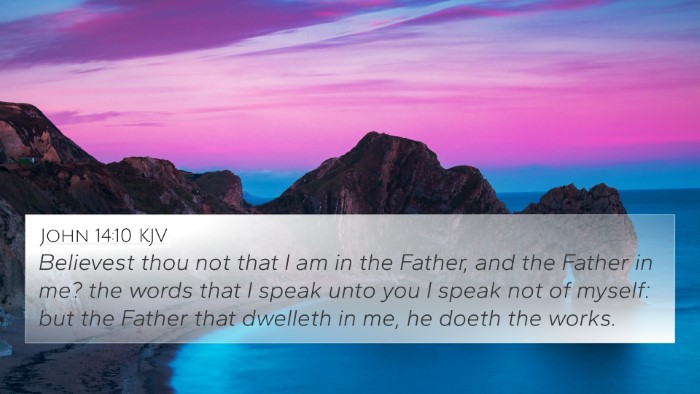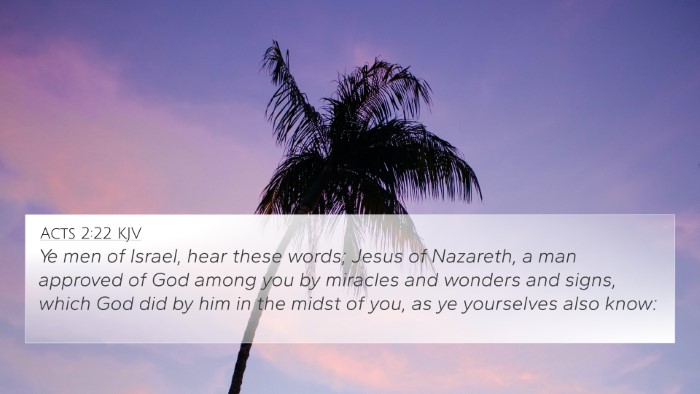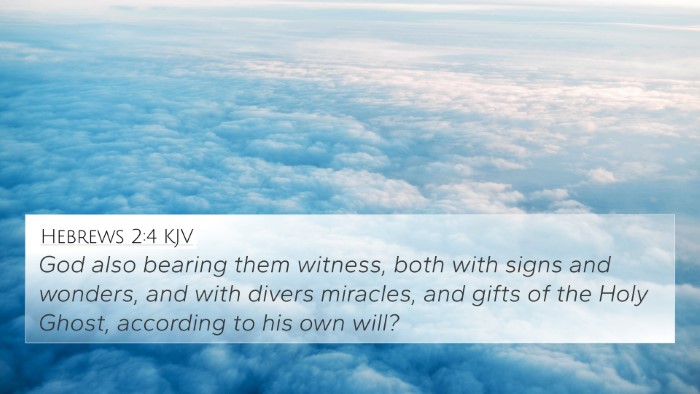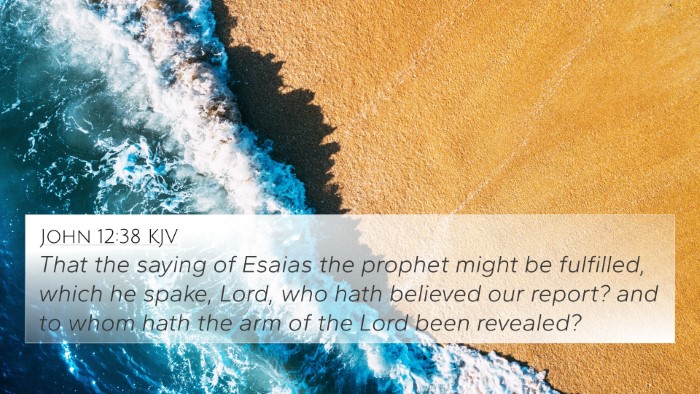Understanding John 14:11
John 14:11 states: "Believe me that I am in the Father, and the Father is in me: or else believe me for the very works' sake."
This verse encapsulates Jesus’ profound assertion of His divine unity with the Father, serving as a cornerstone for the Christian faith.
Below we explore its significance using insights from various public domain commentaries, including those by Matthew Henry, Albert Barnes, and Adam Clarke.
Verse Explanation
In this profound statement, Jesus calls for belief not just based on his words but also on the works He has performed.
This dual appeal points to the necessity of faith that is rooted deeply in both understanding and experiential evidence.
Commentary Insights
-
Matthew Henry:
Henry emphasizes the importance of understanding the relationship between the Father and the Son.
He highlights that this relationship is foundational for Christian belief, suggesting that recognizing Jesus's divine authority should lead to faith rooted in both His identity and His miraculous works.
-
Albert Barnes:
Barnes notes the call for belief in the works of Jesus as an essential aspect of faith.
He expands on this idea by relating it to the signs and miracles performed by Jesus, which visibly showcased His divine nature and purpose—a method of authenticating His identity as the Messiah.
-
Adam Clarke:
Clarke discusses the deeper theological implications of this verse, pointing out that the unity of Jesus with the Father is crucial for understanding the nature of the Trinity.
He reinforces that belief in Jesus is structured on both His character and His miraculous deeds, which serve as clear indicators of divine endorsement.
Bible Verse Cross-References
John 14:11 connects with several other verses that enhance our understanding of its themes:
-
John 10:30: "I and my Father are one."
This verse emphasizes the unity between Jesus and God the Father.
-
Hebrews 1:3: "Who being the brightness of his glory, and the express image of his person."
This highlights the manifestation of God's glory through Jesus.
-
John 14:10: "Believest thou not that I am in the Father, and the Father in me?"
A direct precursor to John 14:11 that stresses the mutual indwelling of both.
-
John 12:44: "He that believeth on me, believeth not on me, but on him that sent me."
This indicates that faith in Jesus is ultimately a faith in God the Father.
-
Matthew 11:27: "No man knoweth the Son, but the Father; neither knoweth any man the Father, save the Son."
This underscores the intimate knowledge shared between the Father and the Son.
-
Mark 16:20: "And they went forth, and preached every where, the Lord working with them, and confirming the word with signs following."
This shows the connection between preaching the word and the divine works confirming their messages.
-
Acts 2:22: "Ye men of Israel, hear these words; Jesus of Nazareth, a man approved of God among you by miracles and wonders and signs."
This affirms that Jesus’ works served as divine validation of His ministry.
Thematic Bible Verse Connections
The themes presented in John 14:11 relate extensively to other parts of the New Testament, particularly in relation to the nature of Jesus as the Messiah and His fulfilling of God’s promises.
Here, we explore how these verses are interrelated:
-
Unity of Purpose: Jesus’ mission reflects God's purpose for humanity, culminating in the salvation narrative, such as in John 3:16.
-
Miraculous Works: The discussion of belief based on works also parallels with John 20:30-31, which emphasizes the signs Jesus performed as evidence of His divinity.
-
Faith and Belief: The requirement of faith, urged in Romans 10:17, underscores the dialogue on belief fortified by witnessing Jesus’s works.
Cross-Referencing Biblical Texts
Understanding and interpreting John 14:11 involves recognizing its place within the broader Biblical narrative.
The connective tissue linking this verse to others serves to deepen one’s comprehension of the message being conveyed regarding the nature of belief and the relationship between Jesus and God the Father.
How to Use Bible Cross-References
For those interested in exploring Bible cross-references more effectively, consider the following methods:
- Utilizing a Bible concordance to find keywords related to John 14:11.
- Engaging with a bible cross-reference guide that elucidates the connections between different scripture passages.
- Incorporating Bible reference resources designed to enhance understanding through comparative study.
- Adopting structured cross-reference Bible study methods that reflect on how various texts relate to fundamental themes.
Further Cross-Referencing Themes in the Bible
The idea of relationship and belief in John 14:11 allows for a deeper approach toward understanding faith in Christ.
You might explore topics such as:
- How to find cross-references in the Bible effectively.
- Identifying connections between Old and New Testament scriptures.
- Bible verses related to faith and belief demonstrating unity in Biblical themes.
Conclusion
John 14:11 serves not only as a declaration of faith but as an invitation to delve deeper into the nature of Jesus’ relationship with the Father.
By embracing the connections between the scriptures—through methods of cross-referencing and thematic exploration—believers can enhance their understanding of God's divine revelation through Jesus Christ.












